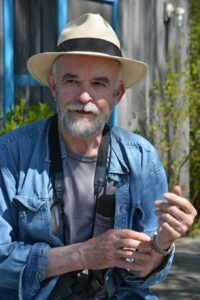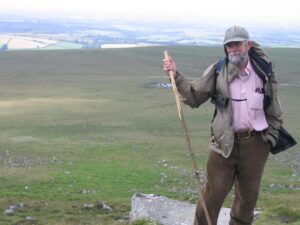Robert Finch of Wellfleet, whose distinctive observations about life on Cape Cod and its nature and history drew comparisons to Thoreau, died on Sept. 30, 2024 at Liberty Commons in Chatham, surrounded by family and friends. The cause was complications of Parkinson’s disease. He was 81.

His essays, in newspaper columns and collected in more than a dozen books, and his radio commentaries on WCAI’s “A Cape Cod Notebook” were beloved and won numerous honors, including a Pulitzer Prize nomination for nonfiction. “His voice was the heart of our radio station,” said Dan Tritle, his producer. “He spoke in poetry. He opened his mouth and brilliance came out.”
Robert Charles Finch was born in Newark, N.J. on June 16, 1943 to the late Fritzi and Charles Finch. His father worked for DuPont, and his mother, originally Frieda Frances Wasserburger, was a dancer who performed under the name Fritzi LaRue. Following in his mother’s footsteps, Bob studied tap as a young child at the Lippel School of Dance in Newark and danced onstage at Newark’s Mosque Theater beginning at age three. He went on to perform as a pianist and singer throughout his life.
His father was transferred to Parkersburg, W.Va., where Bob attended high school and got his first writing job, producing obituaries for the Parkersburg Sentinel. The first member of his family to go to college, he left in 1961 for Harvard, where his freshman year roommate was John Hagenbuckle, whose father ran a sailing camp on Pleasant Bay in South Orleans.
In the spring, John brought Bob to the Cape for the first time, where “he instantly fell in love,” said Kathy Shorr, Bob’s wife.
He described his first experience of the ocean during a storm on that visit in one of his radio essays: “When I first beheld that wild beach, it overwhelmed whatever anticipations or expectations I might have had. My reaction was totally unexpected and, at the time, inexplicable: I turned full front to the ocean, raised both my arms — and began to conduct. … Even then I felt that the ocean was something that took absolutely no cognizance of me. If anything, it was I who was being conducted by the sea, trying to catch its rhythms and tempo, trying, awkwardly, to become a part of its overwhelming majesty.”
Bob worked as a counselor at Camp Viking that summer, and the experience led him to drop out of school and spend the following year in Provincetown, working as a private secretary for Mary Heaton Vorse, and writing for the New Beacon, where he covered town meetings and wrote more obituaries.
Bob returned to Harvard, majored in English, and graduated in 1967. He married Elizabeth Wolford, a Radcliffe College student, in 1964; the marriage ended in divorce. After earning a master’s degree from Indiana University, he crisscrossed the U.S. with Elizabeth and their son, Christopher, a handful of times, returning to Cape Cod for good in 1972.
The family settled in West Brewster, and Bob started writing a column, “Soundings,” which ran from 1975 to 1984 in the Cape Codder, the Provincetown Advocate, and other local newspapers. He also was publications director for the Cape Cod Museum of Natural History.
His first book, Common Ground: A Naturalist’s Cape Cod, was nominated for the Pulitzer Prize for nonfiction. He went on to publish numerous books including The Primal Place, Outlands, Death of a Hornet, The Iambics of Newfoundland, and most recently, The Outer Beach. His final book, Summers in Squid Tickle: A Newfoundland Odyssey, will be published in 2025.
“He had a lot of strong opinions, like Thoreau did,” his longtime literary agent, Ike Williams, told the Boston Globe. “I think he had a lot of Thoreau in him.”
Bob began recording his WCAI commentaries in 2005. They have been a regular feature of the station ever since and won the New England Edward R. Murrow Award for Best Radio Writing in 2006 and 2013.
“He was a great observer of the natural world,” said Dan Tritle. “He had a sense of place observing the Cape, its natural beauty, and how it changed and evolved. His essays gave voice to why a lot of people live here.”
Among his other honors were a Guggenheim fellowship, the New England Booksellers Association prize for nonfiction, a New England Literary Lights award, the Cape Cod Museum of Natural History Thoreau Award, and the Compact of Cape Cod Conservation Trusts Ansel B. Chaplin Award.
Bob’s other books include The Cape Itself, in collaboration with photographer Ralph MacKenzie, and A Place Apart: A Cape Cod Reader. He was co-editor with John Elder of The Norton Book of Nature Writing, which has been used in college courses around the country.

He also taught in a variety of programs at Oregon State University, Williams College, Emerson College, Carleton College, Pennsylvania State University, Cape Cod Community College, the Bread Loaf Writers’ Conference, and the Massachusetts Audubon Society.
Bob was co-chair of the Brewster Conservation Commission from 1980 to 1987 and was a founding member of the town’s land acquisition committee, helping guide the purchase of the 800-acre parcel known as the Punkhorn. After moving to Wellfleet in 1994, Bob worked as a substitute mail carrier and as a garbage truck driver for Dave Furness.
He was an accomplished pianist and singer, performing with the Chatham Chorale and later with the Outer Cape Chorale. Passages from his essay “North Beach Journal” were used as the text for A Chatham Rhapsody by William Cutter, performed by the Chatham Chorale for that town’s tercentennial.
“Bob was beloved in the bass section of the Outer Cape Chorale,” said its conductor, Allison Beavan. “He was always prepared, and there was an enthusiasm and joy about his music making. He had a beautiful voice as a narrator.”
“He was a man of contrasts,” said his wife, Kathy. “Bob was an aficionado of classical music, Robert Frost poems, and artisanal croissants, but he also had a deep appreciation for a cold glass of Coca-Cola, a racy joke, and a snappy piece of dialogue from Seinfeld. He was a man of thrift but loved the cashmere sweaters his brother would send at Christmas, and he was equally at home watching the Boston Symphony Orchestra and enjoying a hot dog in the stands at Fenway Park.”
Bob leaves his wife, Kathy Shorr, of Wellfleet; his children, Christopher Finch of Wynnewood, Pa. and Katy Finch of Portland, Maine; his grandchildren, Anna, Henry, Lila, and Charlie; his former wife, Elizabeth; his nephew, John, and niece, Andrea; his best friend of 60 years, Soheil Zendeh; and his faithful poodle, Sam. He was predeceased by his brother, Dave.
A celebration of his life is being planned, and burial is private.
Memorial donations may be made to the Authors League Fund, the Brewster Conservation Trust, or the Wellfleet Conservation Trust.



